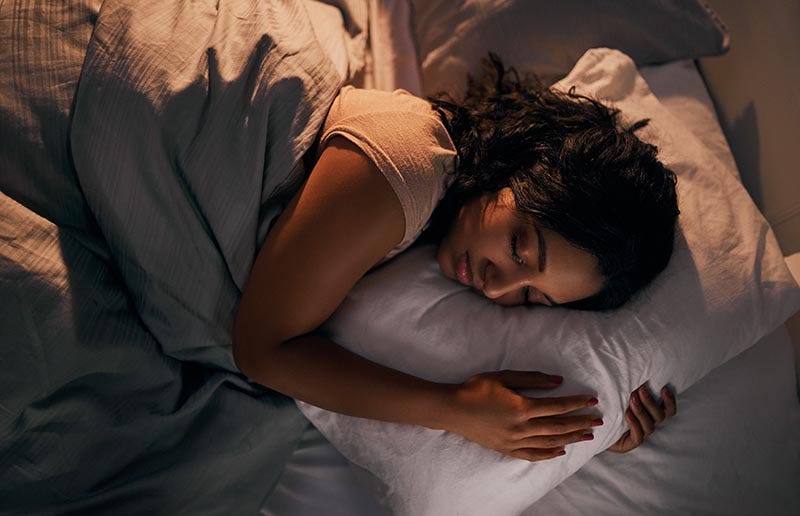Four Underlying Factors for Quality Sleep
We all know how important sleep is. It
plays a central role in our health, emotional well-being and performance at work or school. Yet so many people
experience occasional sleeplessness. Did you know that 43% of adults report that stress has caused them to lose
sleep in the last month, more than one third of adults use medication or other aids to help with sleep, and the
productivity losses of fatigued workers adds up to about $136 billion?1, 2, 3 Here are a few of the
underlying causes of occasional sleeplessness:
- Circadian Rhythm
- Glycemic Regulation
- Stress
- Sleep Hygiene
Circadian Rhythm
Circadian rhythms are daily cycles that regulate everything from our body temperature to hormone levels. They’re
primarily controlled by the suprachiasmatic nucleus (SCN) in the hypothalamus. The SCN is a tiny region of nerve
cells that uses light information from the retina to synchronize internal clocks with the outside world. This
helps us sleep when it’s dark and wake when it’s light.4 The SCN has two main clocks: a central one
that controls sleep and wake cycles, and an external one that’s synchronized with the environment. These two
clocks work together to help us fall asleep at night, stay asleep during the night and wake up in the morning.
When circadian rhythms are disrupted, it can have serious effects on our health.5 Shift workers and
jet lag are two common examples of this phenomenon.6
Glycemic Regulation
Glycemic fluctuations can significantly impact falling asleep and staying asleep throughout the
night.7 Blood sugar fluctuations can lead to waking up at night due to impacts on cortisol, which is
generally seen as a “stress” hormone. One of the impacts of cortisol is the release of stored blood sugar in
response to a fluctuation. When cortisol is elevated, it becomes a challenge to fall asleep or get back to
sleep, as it is a hormone that boosts alertness.8 The sleep impacts of blood sugar fluctuations are,
unfortunately, a feed-forward cycle, which shows that when someone is not sleeping appropriately this can have a
further influence on insulin sensitivity and glucose homeostasis.9
Stress
Stress is all around us and difficult, if not impossible, to fully remove from modern life. Unfortunately, stress
can have a disproportionate effect on sleep, whether this be from the worry that comes along with it, or the
hormone and neurotransmitter impacts. As discussed, elevated cortisol doesn’t only impact glycemic regulation,
it can also be related to melatonin secretion.10 Stress results in the activation of the HPA
resulting in the release of cortisol, noradrenaline and adrenaline, all of which are excitatory
neurotransmitters, important to the waking hours, but very impactful if levels are increased when one is trying
to get a good night’s sleep.
Sleep Hygiene
Pursuing the right lifestyle changes and behaviors can have a much bigger impact on sleep quality than one may
think. Below is a “punch list” to refer to every day that, when followed appropriately, will promote
high-quality, restful sleep.
- No screens for 30-60 min prior to bed – The bright light from screens disrupts our normal
sleep-wake schedule.
- Keep the same bedtime and wake-up time – Our body responds well to a fixed schedule,
keeping to a regular sleep/wake routine will help your body to stay on track.
- Avoid caffeine and alcohol for 4-6 hours prior to bed– Both have larger deleterious effects
on sleep than you realize, either from the obvious response to stimulants or due to the metabolism needs of
alcohol.
- Have a pre-sleep routine – Try out some relaxing activities like reading, meditation,
stretching or peaceful music.
- Finish exercise at least 2 hours prior to bedtime – You need to relax after exercise, and
this can take some time.
- Find the right temperature – The Sleep Foundation suggests a sleeping temperature between
60-67 degrees Fahrenheit as optimal.11
- Improve your sleeping environment – Comfortable bedding, complete darkness and removing
distracting noises can go a long way.
Nutrient/Herb Recommendations
Once the primary impact on sleep quality has been determined, it becomes straightforward to prioritize
appropriate recommendations, based on the unique needs of the patient. Below is a summary of potential options
which can help to support the personalized needs of patients.
Conclusion
Promoting healthy sleep onset is important for and needed by many patients. Having a clear understanding of why a
patient is experiencing occasional sleeplessness is the starting point. Once that is identified and prioritized,
one can determine the appropriate course of action aligned with both the goals of the patient and the underlying
physiology responsible for the patient’s concerns. Check out our latest Sleep
Protocol and sleep
support formulas!
References
- American Psychological Association. (2013, January 1). Stress and sleep. Retrieved from:
https://www.apa.org/news/press/releases/stress/2013/sleep
- Maust DT, Solway E, Clark SJ, et al. Am J Geriatr Psychiatry. 2019;27(1):32-41.
- Ricci JA, Chee E, Lorandeau AL, Berger J. J Occup Environ Med. 2007;49(1):1-10.
doi:10.1097/01.jom.0000249782.60321.2a
- Fukuhara C, Tosini G. Front Biosci. 2003;8:d642–651.
- Radziuk, J. M. 2013;62(4), 1017-1019.
- Waterhouse J. J R Soc Med. 1999;92(8):398-40
- Shoji S, Shoji Y. Nihon Rinsho. Nihon Rinsho. 2009 Aug;67(8):1525-31.
- Hirotsu C, Tufik S, Andersen ML. Sleep Sci. 2015;8(3):143-152.
- LeBlanc ES, Smith NX, Nichols GA, et al. BMJ Open Diabetes Res Care. 2018 Dec 26;6(1):e000604.
- Mohd Azmi NAS, Juliana N, Azmani S, et al. Int J Environ Res Public Health. 2021;18(2):676.
- The Best Temperature for Sleep. Sleep Foundation. Retrieved from:
https://www.sleepfoundation.org/bedroom-environment/best-temperature-for-sleep






